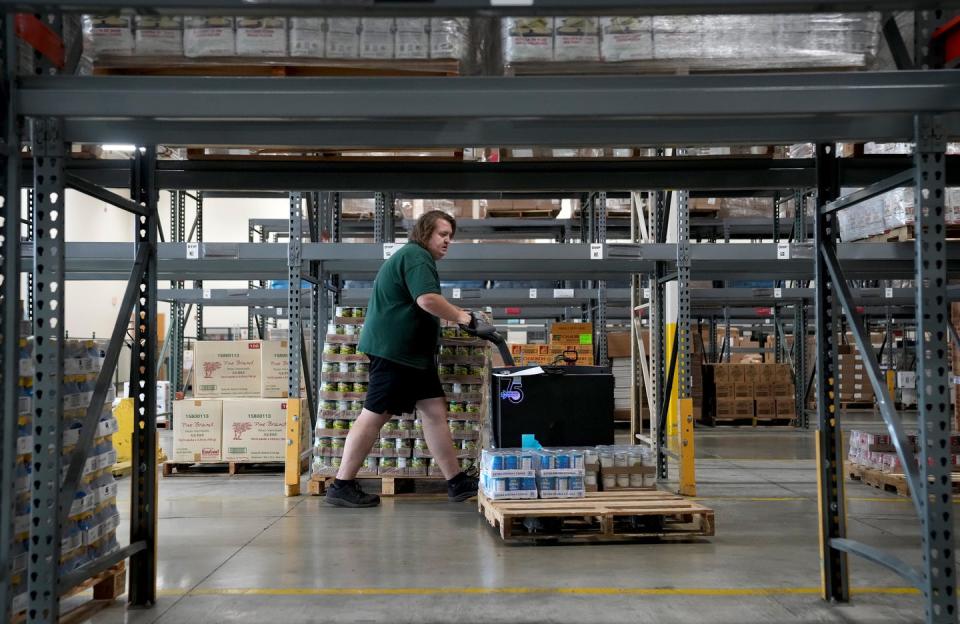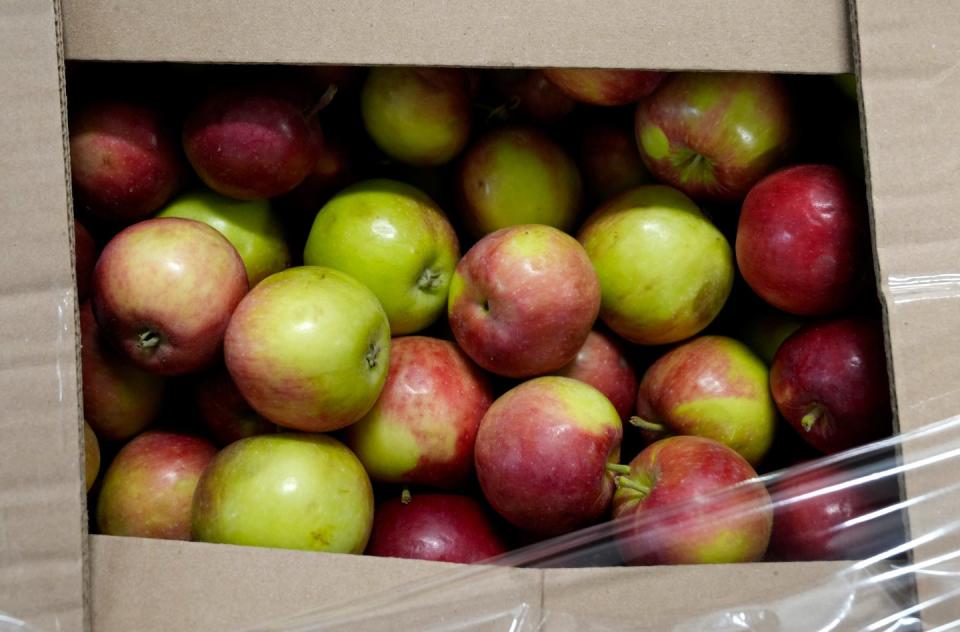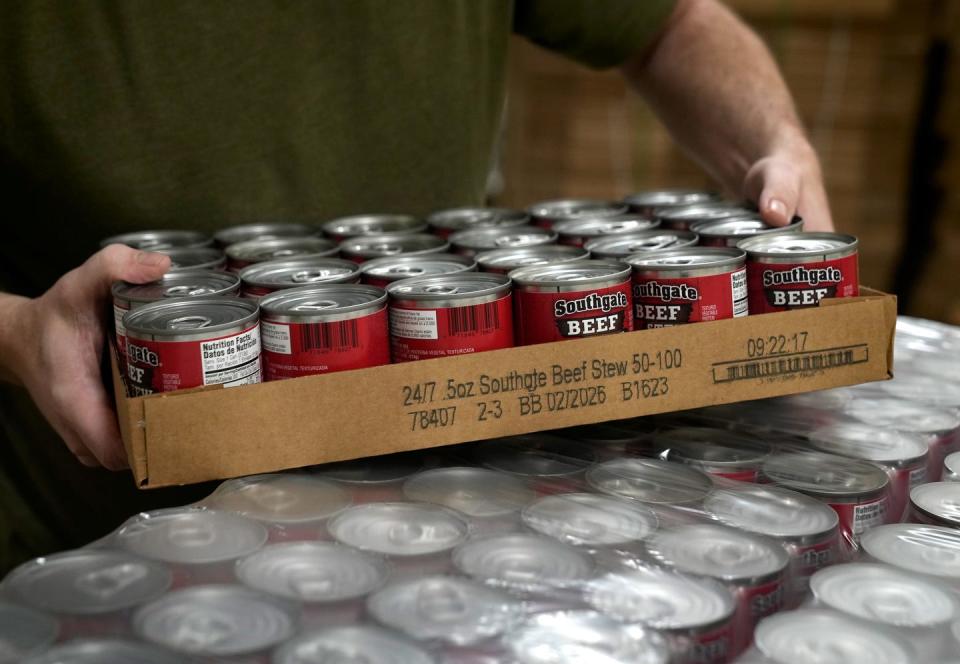More RI families are going hungry. Will free school meals make a comeback next session?
Ana Riley, superintendent of the Bristol-Warren Regional School District, received free meals at school as a kid.
The oldest of six children born to Portuguese immigrants, Riley felt the very real stigma of receiving assistance. Not only did her school offer her free lunches, it packed up containers of leftover milk for her to take home.
"I was mortified," she said. "I was like, I don’t want to take this home. Everyone knows I get this free stuff."
For Rhode Island families struggling to afford meals for their children, that is their reality, she said – a reality that had advocates pushing state lawmakers to pass a pricey universal free school breakfast and lunch program during the legislative session. So far, those advocates have found their goal is out of reach.
"I wish I had enough money in my budget to do it at the district level … the fact is, there haven’t been enough increases in education aid to give the money to districts to be able to pay for it," Riley said.

Food insecurity in Rhode Island the highest it's been in years
The Rhode Island Community Food Bank's 2022 status report on hunger in the state showed food insecurity is the highest it's been in years. Among Rhode Island households, food insecurity hit 31%, up more than 10 percentage points over the previous year and more than triple the level recorded in 2017.
Low-income families, communities of color, and those with children are the most at-risk for food insecurity, meaning they lack reliable access to food and may not know where their next meal will come from.
"The underlying issues for those households are really similar to the kind of reason that food insecurity happens in any kind of household," said Nessa Richman, head of the Rhode Island Food Policy Council, which advocates for a more equitable food system. "We have a lack of affordable housing, we have health issues that exacerbate these problems. We have low wages for many jobs, including a lot of the jobs in our hospitality and service sector. We have high medical care costs."
Even for those with money for food, the question of access to healthy and fresh food arises. Andrew Schiff, CEO of the Rhode Island Community Food Bank, says something as basic as transportation can make or break healthy habits.
"I think it is an issue for families that don’t have a car, that don’t have transportation, because the public transportation system doesn’t always make it easy for people to get to the grocery store," Schiff said. "And even then, the difficulty of carrying groceries to and from the bus and home can make it difficult."
More: Free breakfast and lunch for all RI public school students could be coming soon

Free meals for all students hasn't marshaled necessary support
Among the solutions proposed in the Food Bank's report is the Healthy School Meals for All program, which would use state funds to offer every public school student free breakfast and lunch. Despite support for that initiative, it passed only the state Senate, not the House.
"I think there’s just competing priorities," said Karin Wetherill, co-director of the RI Healthy Schools Coalition, which has pushed for the program. "And I know people are concerned about the cost because it’s wonky. It’s technical."
In a statement, House Speaker K. Joseph Shekarchi said the roughly $40-million price tag on the program wouldn't have been covered by Gov. Dan McKee's most recent budget.
"If we approved that legislation without the funding, it could have been considered an unfunded mandate on all cities and towns," Shekarchi said. "I am working with Governor McKee, as well as Rep. Justine Caldwell, the House sponsor, to attempt to achieve an affordable solution for next year’s session.
McKee's press secretary, Olivia DaRocha, said "we’re not committed to any one single solution to this issue but are looking forward to working alongside our colleagues in the General Assembly to consider ideas and possible solutions about where it stands in [the governor's] list of priorities."
More: Colleges add something to their menus: Making sure students have enough to eat
Rhode Island piloted free school meals during the pandemic with help from the federal government. That ended in 2022. According to the Center for American Progress, California, Maine, Colorado, Minnesota and New Mexico are funding free meals.
In Rhode Island, where 69% of lunches are served for either a reduced price or for free, many children rely on that help.
Stigma isn't the only problem. Some families miss the threshold
For some families, the system just doesn't work. Families provide the school with personal information to see if their household income allows their child to receive assistance. For some, help is out of reach.
"We have a level of families that just miss the criteria," Riley said. "They’re kind of in a window where they make just enough money … but it’s still a burden."
While need is present in every Rhode Island community, some may not realize the extent, even in superficially wealthy areas such as Newport.
Bevan Linsley, executive director of Aquidneck Community Table, which runs farmers markets, community gardens and school gardens, said people generally don't see poverty in Newport.
"One of the issues in Newport is it appears to be a very wealthy city," Linsley said. "There are mansions, tons of tourists and these huge yachts from all over the world. There’s the veneer of wealth."
Yet last year, Newport's largest food bank experienced a spike in demand.
And education about a healthy diet is still a work in progress. Linsley's organization operates a program at Pell Elementary School to get kids outside, introduce them to fresh produce and teach them how to recognize vegetables and fruits.

Fight for free meals 'isn't over by a long shot,' advocate says
While lawmakers may have concerns about the cost of providing children with universal free school meals, supporters of the program emphasize the link between academic success and having a full stomach.
"We hold school districts to very high account for test scores and performance of students," said Rachel Newman Green, the Rhode Island Food Policy Council's director of food access and nutrition security. "And I think that it's beholden on the community to make the connection and help districts, and everybody who's interested in the success of those districts ... understand the importance of good nutrition on the educational outcomes."
According to the nonprofit Feeding America, food insecurity correlates with diminished math scores and needing to repeat a grade. When kids go hungry, they're less able to focus and less able to learn.
Though the universal free school meals initiative hasn't yet found its place in Rhode Island, Richman remains undeterred.
"There's a big price tag, and that makes it difficult to get included in the budget," she said. "The governor's budget makes it difficult to get it passed at the State House. But the fight for healthy school meals for all isn't over by a long shot. I think you see across the country there's legislation being introduced in so many places, and it's being passed in a lot of places now as well."
This article originally appeared on The Providence Journal: Food insecurity is way up in RI: Are free school lunches the answer?

